I think it’s safe to say that 2014’s greatest hero is a vocabulistically-limited tree. (If not him, then maybe the raccoon with anger management issues.) I had already been think about how heroism and villainy seemed to be changing this year after I saw How to Train Your Dragon 2 and The LEGO Movie. Captain America: The Winter Soldier and X-Men: Days of Future Past also gave us far more ambiguous heroes and villains than their predecessors, and then I saw Guardians of the Galaxy.
And now, I think that the Western is evolving in some really exciting ways, especially when we look at how heroes in 2014 stack up against some of our biggest cultural good guys. Be warned: I might be completely wrong. I have accepted this, and am quite open to being yelled at in the comments. Also, spoilers abound! It turns out it’s hard to write about villain-deaths and Noble Heroic Sacrifices without giving away endings, so proceed with caution.
It wasn’t until I read Steven Zeitchik’s essay in the LA Times that I finally put everything together. Zeitchik theorizes that film has entered a post-plot age, and that since TV is providing some of the great storytelling of our era, blockbuster films have begun to coast on pure spectacle. While I certainly see that point with regards to say, Transformers and the Turtle abomination, I think that some of the most popular films of the year are far more interesting that that, because I think they’re using a new heroic paradigm.
He cites both Guardians and The LEGO Movie as examples:
In fact, “Guardians” seems to be the logical convergence point of two distinct trends that have been growing for a number of years now—in which spectacle on the one hand […] and quippy reference on the other take pride of place, effectively crowding out traditional storytelling. That Hollywood’s other major outsized success this year—“The Lego Movie”—is characterized by this same marriage seems like no coincidence…. Like “Guardians,” “Lego”[…] involved some misfits who go on the run, have lots of quippy fun and get mixed up in some big action set pieces whose actual import doesn’t matter.
I would disagree here. Guardians and The LEGO Movie are indeed a convergence of a few distinct trends, but I think Zeitchik has misidentified them. We’re post-plot because we already know all the plots. The new direction for the hero plot is to explore the theme, tone, and emotion of the journey itself. The important aspect of the hero’s journey now is to learn to communicate. The Solitary Noble Hero is being replaced, or at least supplemented, with the Fellowship of Equals. Finally, we are trying to erase the lines between “good guy” and “bad guy.”
About a thousand years ago, I wrote a paper about Tolkien, Lucas, and Rowling, and how each of them subverted the traditional hero’s quest. Nothing earth-shattering, but it does make for an interesting look at how our ideas of heroism have evolved: a typical Medieval hero went into battle alone, slew Grendel/the dragon/icky non-Christians, and possibly rescued damsels. The story ended with the death of the bad guy, often followed by the noble and sanctified death and/or religious redemption of the hero. Tolkien took these stories and chose a much different path.
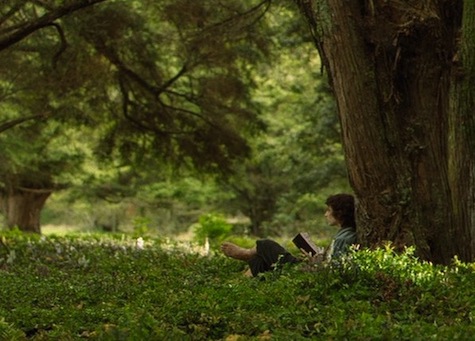
First, he gave us a hero who was completely unsuited to his quest, and a companion who was only marginally better. By working together, Frodo and Sam are able to do something that no human or elf could have done. (Tolkien even dances up to the edge of English class issues by giving Sam the credit he deserves.) What Tolkien does not do is turn the two of them into born-again warriors. They fight when they have to, but almost all of their combat is in immediate self-defense, and they ultimately win not through a battle but through a willingness to sacrifice themselves. They walk into Mordor and destroy the Ring, which is a far more difficult task. Aragorn could have slain as many orcs as he wanted to slay: as long as the Ring remained, the day would not be won.
So what is the other mark of the traditional hero? He’s a warrior, and he works alone. Whatever his Quest is, in the end it comes down to his Mighty Strength and/or Noble Sacrifice. From Beowulf to Roland to the Scarlet Pimpernel to Rick Blaine to Indiana Jones—even when there are companions, damsels, or battalions, the hero is exceptional, either by birth or by sheer hard work, he is willing to walk into danger. He is willing to lead. After his horrific experiences in World War I, Tolkien took a slightly different tack.
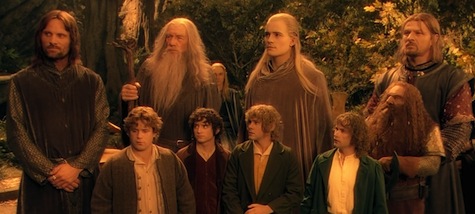
Quick, who’s the leader of the Fellowship? Is it Aragorn, the man who was born to be King? Because, as stated above, his warrior shtick doesn’t matter if the One Ring survives. Is it Gandalf, the wise and powerful Wizard? Cause he, um, dies at a certain point, and the Fellowship continues without him. Is it Frodo, Ringbearer? Wellll…Frodo leaves halfway through the quest, and has a completely different adventure with Sam. Each of the components of the fellowship was vital to its success. The Hobbits may bow to no one, but the Fellowship is made up of equals, even poor fallen Boromir. (He’s your stalwart White Protestant-ish dude, by the way, who, in a normal story, would be the one slaying the dragon at the end.)
There’s a reason LOTR caught on in America when it did, after all—a lot of American kids and countercultural-type people were fed up with the whitebread hero saving the world with his fists. This Fellowship model was another obvious influence on Star Wars and Harry Potter: Luke may have to face his father alone, but much of his heroic work is done in tandem with Leia, Han, Chewy, and even Lando, and Harry Potter wouldn’t have made it as a hero without Hermione, Ron, and alternate-universe hero Neville.
So if we’ve already shifted from expecting a Noble (violent and solitary) Hero to a group of talented people who might use non-violent means to succeed, what’s the next step for the Western Hero? The newest shift seems to be happening now, the first big step in heroic writing that we’ve had since Tolkien. And its building on the stuff that came before it, but I think it’s pushing us in a new direction. Maybe even a new way to classify heroism itself.
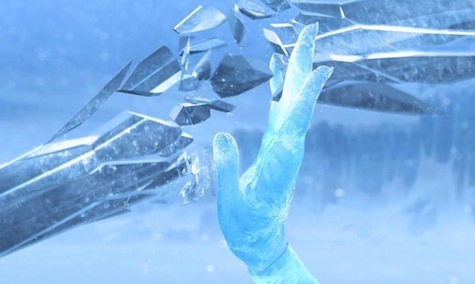
Frozen revolves around two hero quests: Elsa’s journey to understand and control her powers, and Anna’s rescue mission after Elsa runs away. So here we have an internal struggle and a traditional search. Anna is the one who makes the Noble Sacrifice—saving Elsa, defeating Hans, and lifting her curse all in one fell swoop. (Anna is the most efficient hero.) And it is Elsa’s love for her sister that allows her to use all of her powers, and restore warmth to the Queendom.
The two villains, Hans and the Duke of Weselton, don’t matter very much. Hans’ treachery is horrible (“Aw, Anna! If only somebody loved you.” Shudder. Shudder forever.), but in the end, Anna’s right. He isn’t a match for Elsa. He’s no match for Anna, either. Elsa defends herself quite capably from the Duke’s goons (but without becoming a “monster”) and the Duke himself is thrown out of Arendelle by unnamed guards.
Usually we get a violent confrontation between hero and villain while the helpless princess looks on (Beast vs. Gaston, Eric vs. Ursula, Philip vs. Maleficent, Simba vs. Scar, etc.). Here the “helpless” princess, Anna, rejects Kristoff’s offer of True Love’s Kiss to save the apparent villain, Elsa, from the actual villain, Hans. The True Love between the sisters is so powerful that it defeats Hans’ physical strength and Elsa’s magic, and lets the film sidestep the violent climax entirely, while subverting the audience’s expectations of what heroism looks like.
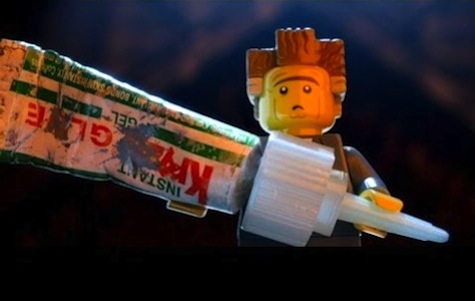
The LEGO Movie hangs a lampshade on its archetypes. There are grand old wizards, Master Builders, The Special, the Piece of Resistance, and Evil Lords. At one point everyone thinks Emmett Brickowski is The Special, but he doesn’t even want to be The Special, he just wants to have friends so he can hang out on his double-decker bunk-couch and watch TV with them. Then he’s briefly the Plucky Young Man Who Believes in Himself So Hard He Becomes a Hero. Finally, he becomes the Noble Self-Sacrificing Hero, and dies for his friends. And under the old paradigm, either WyldStyle would take up the baton and lead them to victory, or Emmett would come back changed into some sort of superbeing who could defeat Lord Business with a touch of his hand.
Instead, Emmett returns to his life with his normal amount of strength and mortality, but with a new perspective on his life and world. Instead of suddenly being able to defeat Lord Business, he just goes up and talks to him. He says the exact thing that all of us wanted to say to dumb bad guys in dumb movies when we were kids:
You don’t have to be the bad guy. You are the most talented, most interesting, and most extraordinary person in the universe. And you are capable of amazing things. Because you are the Special. And so am I. And so is everyone. The prophecy is made up, but it’s also true. It’s about all of us. Right now, it’s about you. And you… still… can change everything.
And Lord Business listens to him, considers what he says, and changes his mind. When was the last time you saw a villain change his mind on camera? And as if that isn’t enough, there’s a hug.
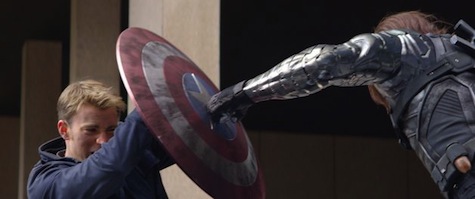
This year was pretty well saturated with Marvel characters. While Captain America: The First Avenger ends with a giant battle with Red Skull and the Noble Solo Sacrifice of Steve Rodgers, The Winter Soldier makes Cap part of a team of equals, and gives each of them a vital role in saving the world from Alexander Pierce. It’s Widow who makes the big Sacrifice play. Steve misses the big showdown completely, because he’s busy trying to work shit out with Bucky. The most American of heroes puts his friendship before everything else.
We can compare the endings of X-Men: First Class and Days of Future Past in the same way. First Class culminates in a violent showdown that leaves Charles Xavier paralyzed, Sebastian Shaw dead, and Eric firmly on the villain side of the hero/villain spectrum. Days of Future Past sets us up for a similar ending: Charles vs. Eric vs. Trask/Nixon vs. Mystique, with Sentinels mowing down mutants in the future, and Wolverine chained at the bottom of the Potomac. Mystique, having already rejected the Noble Sacrifice that Eric wanted her to make, now rejects the violence Trask and Charles both expect from her. She wounds Eric, disables the Sentinels, shows the President that Mutants are A-OK, and saves the future. Like Anna, Mystique is also an efficient hero.
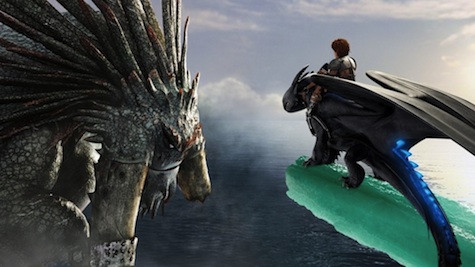
How to Train Your Dragon 2 is about Hiccup and Toothless’ shared hero quest. Of all the heroes in these films, Hiccup is the most determined to seek communication with others. He never resorts to violence, and not even because he’s small for a Viking: he genuinely believes that talking to your enemies and finding empathy for them will solve all problems. It worked with Toothless and his father in the first film, but here it fails in a sense—when Hiccup encounters Drago, he finally meets a man who won’t listen to anything he has to say. However, Hiccup’s talent for communication is rewarded elsewhere in the film, as he can speak to new dragons, and eventually helps convert a pirate over to the dragon-loving side.
His talent for empathy is also what converts this from being a standard heroic bildungsroman into something new. At the center of the film, there is a horrible moment, the type of thing that defines a hero. Toothless, as a young dragon, falls under the mental power of the Alpha, a much more powerful dragon, who is in turn controlled by Drago. Drago turns Toothless against Hiccup, and in the ensuing blast of fire Stoick dies saving his son. Drago takes Toothless and leaves to invade Berk. At this point Hiccup has to make a choice. He can condemn the dragon, and become as bitter and hateful as Drago himself, or he can forgive Toothless and trust that their friendship is stronger than Drago’s will. By making the second choice he becomes the man who can take his father’s place as leader of Berk. When Hiccup is asked about his plan, he replies that he’s going back to Berk to rescue Toothless, and kick Drago’s ass. What actually happens is that he and Toothless rescue each other, and Toothless bypasses Drago entirely to challenge the Alpha. Both human villainy and heroics are rendered irrelevant as the dragons battle for supremacy. Hiccup can’t be the Noble Hero, because his world is too complicated.
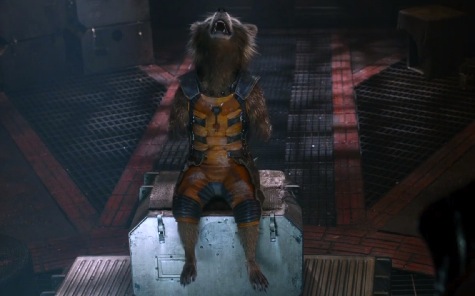
So, what sort of heroes is Guardians giving us, and why are they so popular? If we look at the Avengers, we see a cartoonishly moral supersoldier, a genius billionaire playboy philanthropist, a top physicist/green rage monster, the world’s greatest spy, the world’s other greatest spy, and a Norse god. What do we see in the Guardians? They’re bad at everything they do. They’re not even particularly competent at their lowlife jobs at the beginning of the film. Quill is doing his best to be a devil-may-care thief, but Indiana Jones he is not. He gets caught stealing artifacts, gets his ass kicked by Gamora, and when he does manage to act heroically, he has to ruin everything by pointing it out. When the time comes for him to step up and give a rousing Hero Speech, the best he can come up with is “Life’s giving us a chance to give a shit.” (Not to save the galaxy, but simply to care about it. That’s a fairly low bar to set for hero-ing.) Drax fucks up his attempt at Lone Noble Dude-hood, Gamora doesn’t have the heart to be a cold-blooded assassin, Rocket’s a walking wound, and Groot…well, Groot’s perfect. But also, not a natural heavy.
As a film, The Avengers had a solid plot—Loki steals the tesseract, tries to invade earth, the Avengers gradually assemble and stop him. There’s some trickery, some reversals, a catalytic death, and then Loki’s plan is thwarted and shawarma is had by all. Pretty straight forward, and the film begins this plot immediately. The first thing we see is Loki stealing the tesseract and brainwashing Hawkeye, and then everything unfolds (relatively) logically from there.
Guardians, though, doesn’t seem to care about its plot. As the film begins, the first sound we hear is pop and hiss of tape unspooling (Actually, I didn’t so much hear it as feel it, the almost subliminal click in the back of my brain, as the tape started to move.) and we see the once and future Star-Lord listening to 10cc’s “I’m Not In Love” while his mother dies in the other room. From here we have a film that jumps in time, hops from planet to planet, and careens through a wide range of emotions with little regard for whether we can keep up. James Gunn is trusting us to care enough about the characters that we’ll accept an emotional hero’s quest rather than a traditional plot-driven one. After starting with that raw opening scene, we return again and again to Gamora’s murdered family, Drax’s murdered family, the torture inflicted on Rocket, Ronan’s religious war, the terrified people of Nova City, Groot’s essential solitude. The real story is how each of these people come to terms with their pasts, and find a new type of heroism by joining together.
Best of all, it’s made clear at the end that they don’t reform. They don’t have any kind of epiphany. No one discovers some untapped potential. No one realizes that The Power Was Inside Them, All Along. They are only capable of becoming what they become through working together. The group bonds over a shared sense of loss, Drax apologizes for challenging Ronan, Gamora stops insulting Rocket, Quill puts Gamora’s life before his own (sort of), they accept each other for who they are, and become a true team. The Avengers choose to be a team, because their strength combined is extraordinary. The Guardians have to be a team, because their combined strength is what makes them heroes. And again, who’s the leader?
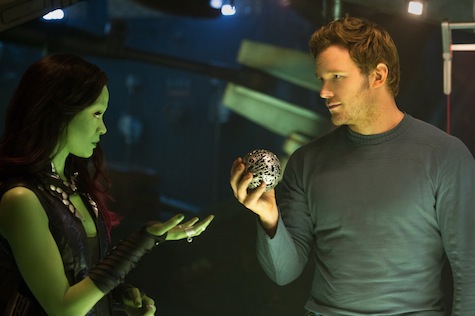
Is it Quill? ’Cause Gamora’s the one who insists they give the stone to Nova. And Drax is the one who shoots Nebula. And it’s Groot who saves them when the ship crashes. But Rocket’s the one who actually knocks the stone out with his super-gun. Although he’s only able to build the gun because Quill distracts Ronan.
Guardians establishes a round robin of heroism throughout their battles, and then pays it off in the two climactic scenes at the end. First, as the ship crashes, Groot wraps the rest of his group (his fellowship) into his branches, and names them all Groot. They are not just his family, they are part of him. When was the last time a true action film made time for that kind of statement? But that isn’t even the only one. After Groot’s sacrifice, the group reconvenes for the last attempt. Quill does the Noble Hero thing, and dives to catch the infinity stone, knowing that it will kill him. But not only does he live, his three remaining friends hold onto him to help bear the weight of the stone, and with their combined strength, they’re able to wield the stone against Ronan. We are Groot. We are the Guardians of the Galaxy.
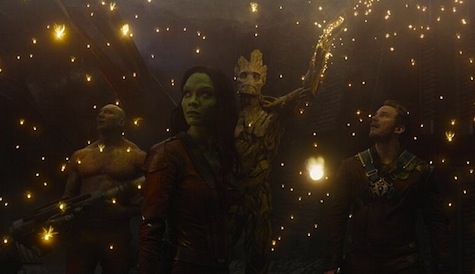
But these films don’t stop with simply giving us a team of heroes rather than a single one: they also give us new types of villains. In Frozen the sisters’ real battle is to form a better relationship with each other, and the efforts of the villains don’t matter much. Compare the Duke of Weselton’s thugs with Gaston. Compare Hans with Ursula, or Cruella de Ville. They’re inconsequential. In Days of Future Past, Eric is not exactly a villain (he has some uncomfortably astute points about human/mutant relations…) and Trask is defeated through a public act of non-violence. In Dragon 2 Toothless commits the most “villainous” act, and is forgiven. Drago, meanwhile, actually gets a chance to explain his side. In The LEGO Movie the bad guy learns that he, too, is the Special, and decides to stop being the bad guy.
And in Guardians, Ronan and Nebula both have legitimate grievances. I’ll agree with many critics that the film doesn’t spend quite enough time with them, but these are not cardboard cut-out villains. The only things that make them “bad” is that none of them can see past their own personal pain. They want to inflict their losses and fear on the world, and ultimately it’s this failure of empathy that makes them villains.
So what does all this mean, if anything? Are we moving into an era of the non-binary hero quest, where heroes and villains are not so easily defined? Where communication and fellowship are valued over brute force? Where the people we thought were our greatest enemies turn out to be just as Special as us?
Leah Schnelbach always seems to sympathize with the bad guys. She’s making a heroic effort to Tweet more!










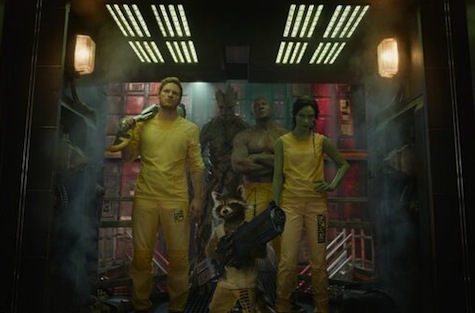
What? No, I’m fine. Just something in my eye… oh, fuck you, I’ll be over here crying again…
It feels to me that we are tracking back to what we saw happening in the 1990s in terms of ingenious misfit teams. The solitary noble hero (or barbarian hero of yore) was on his way out even then. After the event at the start of the millenium, we went into a period where there were no heroes or villians, just brutal people doing brutal things and justifying that they felt the brutal things they were doing were right, or in some cases “for the greater good”. Now though, as blurry as the lines are, we’re starting to redraw those lines between hero and bad guy. People are becoming familes again, coming together again, starting to hope again. The brutal guy doing brutal things for the greater good, is the bad guy again (thank goodness) and their greater good is reveal as pure selfishness again.
This is the logical progression from where the 90s were tracking, and this is a damn fine sign if you ask me.
his three remaining friends hold onto him to help bear the weight of the stone,
FOUR! Groot is there, Rocket’s holding him in his other hand
*sobs*
@1 *shares tissue*
@1, 3 &4: Just think of the dancing baby Groot. It helps hold off the…
oh, pass me one too!
Aw, crap. Aeryl, you’re right, and now I’m crying.
@5, It’s ONLINE NOW!
*evil laugh*
There is also this to make you smile.
Rocket & Groot as Calvin & Hobbes
http://www.themarysue.com/gotg-calvin-and-hobbes-mashup/
To focus on the thesis of the article, I agree.
The old paradigm of heroes and villains is done. It remains to be seen how well old school heroism like Star Wars can make this transition(Gwen Christie as an Imperial gives me hope they won’t be going for a straight good/evil dichotomy).
Another great example of this(and kind of a forerunner to the kind of stories we’re now seeing, IMO) is the Avatar series on Nickelodeon.
The first series took the time to craft a story that showed there were plenty of “evil” people on the side of good, and plenty of good people on the side of evil. That violence and death can’t solve all your problems. Ozai as a Big Bad was fairly Manichean, but even his psychopathic daughter was given a sympathetic treatment.
The second series expands this, and while the bad guys do bad things, they do it for reasons you can understand, and even support. Because you feel the art of bending creates inequality, because you feel closing the world off from the spirit world created an imbalance, because people cannot be free when they are ruled by absolute monarchs. It’s fascinating dynamic stuff, and I love that this is the content being created for children.
Random22 makes a very good point that “9/11 changed everything” and in a lot of ways for the worst. We regressed, societally. We again became obssessed with the boogie man and our night time fears. Even now, as we watch another community of color mourn the loss of one of its children, we see that those in authority still do not know how to sit with fear.
There are things to be afraid of in this world, absolutely. As a woman, I am fully aware of that. But I think that this new set of heroes is about showing us, there are other ways to respond to fear than to run away from it, like Elsa or Rocket, or kill it, and that is what we are seeing now. We as a nation saw how our fear led us to the debacle in Iraq, and we are ready for some critical examination into how we, as a culture, deal with fear.
Do we enable those who are afraid to freely intimidate others? Or do we investigate that which makes us afraid, to discover if our fear is grounded? Do we isolate ourselves from those who can help us? Or do we bond with others who share our fears, and become something better?
These are the questions our heroes are asking us, and it’s about damn time.
This was an awesome article! I totally enjoyed reading it. .
Honestly GotG was so complicated and fast-paced that trying to keep up with all the information and characters almost gave me a headache, but it was the set of 5 heroes that held it all together and made it utterly irresistable.
Excellent article Leah!
Internet’s full of complaints, so I thought (given your dip into the “We are Groot” theme) that giving praise was absolutely warranted. :)
i’d say the trend away from the black and white is simply writers getting smarter and (finally) realizing that their audience is smarter. the world isn’t black and white; it’s shades of grey (way more than 50 of them). people don’t have to entrench themselves in a certain paradigm, they can choose to change.
these are truths that give me hope for the future on days when the actions of a few disrupt the lives of many. because on those days, there are indeed heroes and villians, but who knows what they’ll be tomorrow.
Ah, so we have shades of gray in American pop culture now. Nice to see ’em finally catch up to… Huckleberry Finn.
brilliant analysis
But sometimes, having a straight-up evil-and-loving-it villain is just FUN. I do enjoy “complex” villains like Erik/Magneto, but when you say “Compare the Duke of Weselton’s thugs with Gaston. Compare Hans with Ursula, or Cruella de Ville”… those villains are EXCELLENT! Wicked AND charismatic! I miss them! I’m a little sad we don’t have MORE of those anymore (though, I realize they would now probably be derided as cartoony or one-dimensional, since we’re all used to the complicated villains-with-backstory now).
Tbh, this is why I couldn’t go see Malificient… I didn’t WANT Malificent to have a mournful, sympathetic backstory that explained her villainy. I liked the old, gleefully wicked Malificent who threw down curses just because she wasn’t invited to the party, and enjoyed messing with people’s heads just for the sheer pleasure of it.
I’ll start with an older movie because I’ve been noticing the changes in storytelling for a while now. Rise of the Guardians was not one of my favorite movies, but there were a lot of things that I liked in it. Whenever anyone mentions RotG, one of the first things I think of is Cupcake. When she was first introduced the other kids were afraid of her. When Jack – still unknown to the other kids – used his magic to bring her into the fun, the result was a nice upbeat in the overall scene. And then – well, more important is what didn’t happen then. There was no awkward scene where the Beaver says “Gee Wally. I should have . . .” Through the rest of the movie she was just a part of the group without it being pointed out in dialogue. This seems like a minor thing in contrast to the overall story, but it is more important than that. This was the first display (within the movie) of Jack’s true potential as a Guardian. However. Even this hero can fail. His attempt to turn Pitch with the snowball didn’t work just as Hiccup’s attempt to reason with Drago failed.
And speaking of Pitch. In light of this article, I have to ask ‘Why can’t Pitch become a Guardian?’ Fear is what it is to us for a reason. Fear is used in children’s stories to teach lessons. And we, most of us, grow to love fear in entertainment to one degree or another. Pitch, as a Guardian, could strike just the right note of fear to guide a child out of getting into trouble. Pitch could grow to be loved while continuing to do what he does best. While I don’t have a name for the new villain Jack, and Pitch, and the rest would face, I have an idea of what that villain’s power could be based on – “I don’t know/I don’t care.” Or, is that too close to The Nothing?
Now I want to talk about Astred in How To Train Your Dragon 2. She is not one to be a damsel in distress. She is strong willed, willing and able to make tough quick decisions, and, like Hiccup, she can be wrong. But, what was more interesting, to me, in this movie was how her relationship with Hiccup was depicted. She and Hiccup were/are equals in that relationship. In the reviews I’ve read, many critics spoke glowingly of the scene where she imitates Hiccup while he’s imitating his father. It is a fun scene, don’t get me wrong, but there was one little thing in that scene that I feel too few people noticed. Just before the imitating started, she took Hiccup’s charcoal pencil and added details to his map. He glanced at her action with approval. (That little bit, like with Cupcake in RotG, caught my attention and told me so much with very little effort.) Here we have a hero (Hiccup) who seems comfortable with an equally strong willed companion in his life. I’ve been trying to think of another relationship that played the same as Hiccup/Astred. Anyone care to offer suggestions?
First off, I totally want to read this Star Wars/Harry Potter/Lord of the Rings essay.
Second off, it was this part that made me want to tear up a bit: “You don’t have to be the bad guy. You are the most talented, most interesting, and most extraordinary person in the universe. And you are capable of amazing things. Because you are the Special. And so am I. And so is everyone. The prophecy is made up, but it’s also true. It’s about all of us. Right now, it’s about you. And you… still… can change everything.” (Seriously – that movie kind of blew me a way, partially because when I first heard about it I thought it would be one of the stupidest things ever made). It makes me passionately wish that’s really how things could be resolved in the ‘real world’ (seriously, why can’t it be?).
Interestingly, I am not sure I can think of many ‘solo hero’ type stories because most of the stuff I grew up on was influenced by things like Star Wars or Lord of the Rings, where you had some band of heroes – perhaps the exception being some the various Disney movies I loved. But even those typically had a cast of sidekicks to help save the day.
I do agree that in some instances there is a place for more straight up evil villainy (as well as straightforwardly noble heroes like, oh, I don’t know, REAL BOOK FARAMIR) – some people/groups are pretty straight up evil and want to cause pain and dominate, and know what they are doing. Maybe they do have sympathetic backgrounds, maybe not. But overall, I applaud a general knowledge that we have flaws (and can overcome them) and that everybody also has some dignity/goodness in them.
@Aeryl, I know what you mean. I’ve been thinking a lot about what is going on in Missouri right now and it’s just so sad, especially as it is not an isolated incident. I wonder if these people are consciously racist or hostile, or do they just react in fear (as in, at that moment they truly see a threat) because of whatever unquestioned biases and assumptions they are operating under, as well as a general disregard for life of the ‘other’.
Cannot comment on the entirety of this essay as I’ve not actually seen some of the films references – the one issue I will raise is with Dragons; the entire crux of its plot is manufactured not simply with one plot device, but with two.
1. The “good” Alpha isn’t strong enough to take down the “bad” Alpha (had that happened, the subsequent action with Toothless and Stoick would not have been able to take place); although it can be argued that this situation, in and of itself, isn’t necessarily manufactured. Reality sometimes means good does not triumph in every battle;
2. however, the entirety of the villain’s story here is that Drago is able to control a creature he detests and wishes to destroy and this more powerful, sizable and wild being permits it. This plot point, which drives the existence of the entire movie, is manufactured for no reason other than so the story happens.
No magical staff powered by a blue orb is needed by Drago, his control simply occurs; at the very least, Days of Future Past tells us that the existence we are shown at the beginning comes to past because of a pivotal event that the story then is created to prevent – the equivalent to Dragons would be to not even require Trask to need any blood, his Sentinels would just be simply because the writers could not even come up with appropriate techno babble.
The far more intresting version of Frozen (and with less annoying singing), also coincidentally features Dinklage and McAvoy, but it (with it’s other failures) does feature a tacked on past resolution ending where the heroine ends up with the ‘leading’ man.
Good article, Leah, you raised a lot of good points.
I am not sure that Mr. Zeitchik is on the mark with his “post-plot” comments. His article makes it clear that he and his fellow critics were too distracted by the SF trappings to realize that there was a rather simple and straightforward plot to the move. The plot was your standard “group that dislikes each other, but learns to respect each other, while chasing a mcguffin that could threaten lots of folks/the world/the universe.” You can drop your average moviegoer in the midst of an SF world, and have them figure it out pretty quickly, but for some reason it seems ‘serious’ movie critics can’t make the leap. They are too distracted by the alien beings and the special effects to see that there are still characters here, with the emotions and motivations that characters have always displayed.
And I would not call these few recent storytelling examples a move from one age of storytelling to another. Like Redlander @13 stated above, the anti-hero has been around in American literature since Huck Finn, and first appeared long before them (the gods of Asgard and Olympus, for example, were the original anti-heroes). And, as someone who is within spitting distance of 60, what many people see as trends, I see as cycles or short term shifts in one direction or another. In my lifetime, I have seen lone heroes, groups of heroes, anti-heroes, etc, at one time or another. I am sure, back in the days of Homer, critics were saying, “Look at the group effort of the Iliad giving way to the solo hero of the Odyssey–the fellowship of equals is being replaced by the solitary noble hero–I see a trend here.”
I have a writing book somewhere in my cellar that was written by Ben Bova (or had an article by Mr. Bova) where he argues that good writers don’t have heroes and villians, they have protagonists and antagonists, and both of them have what they feel are valid aims, and think of themselves as being in the right. Those words had a big impact on me. Neither your ‘hero’ or ‘villian’ is perfect, and while one can be moral and one amoral, yet both should be driven by valid logic and believable emotions. That, to me, is at the heart of good storytelling. And unfortunately, in my opinion, that is one area where Guardians fell short, and in a very traditional manner. The Guardians were well drawn and believable, but because the motivation of Ronan and his minions was sketchy at best, they never came to life. It was clearly a story of heroes and villians. Flawed heroes, and self aware, snarky heroes, but in the end, pretty standard heroes.
@random22 et al: In fact, the trend towards less iconic heroes and villains is older than that. Movies and television were showing us anti-heroes and “Average Joes Just Trying to Make It” in the 60s and 70s, largely post-Korea and post-Mississippi, when the moral ambiguity of the former and the outrage of the latter forced America to reassess itself and its definitions of heroes and villains.
Two-dimensional heroes and villains reasserted themselves with Star Wars and the many mindless action films of the 70s and 80s, and it took time for America to remember that not characters are so cookie-cutter good or evil. We’ve been swinging back and forth between both extremes since then.
Guardians is certainly not new. In a lot of ways, it reminds me of the late James Garner’s western characters, and of course his Jim Rockford, banding together with whoever he can get to help him in his quest to overcome his mistake-laden past, do the right thing and find a safe side of the street to live on… the Liberal Ideal, as it were.
And maybe therein lies the root of the swings between hero eras over the years… one side being very Conservative in its take on heroes and villains, the other being very Liberal, and roughly following the swings in popularity of those political concepts. And Guardians reflects our modern era, with its Stereotypical Mindless Evil sitting in for today’s terrorists, the Nova Corps being our conservative military forces standing against them, and Quill and Co. representing the liberals that step unexpectedly into the fight, out of their own sense of need, to tip the scales in Good’s favor.
And in the end, they don’t get rewards or shiny medals, they get permission to go live their lives as they see fit. Maybe they’ll win the lottery tomorrow… but they’ll look for a new job today. As is the American way of 2014.
Hi Leah,
I am a high school English teacher and seeking your permission to use your blog post with my class. We are studying the evolution of herosim, starting with The Odyssey, and I think the students would find your post very thought-provoking. May I make 150 copies of it?
Thank you,
Katrina
Serenity. Mal doesn’t win by blowing things up, a la every other sci-fi space opera movie ever, but by changing The Operative’s mind.